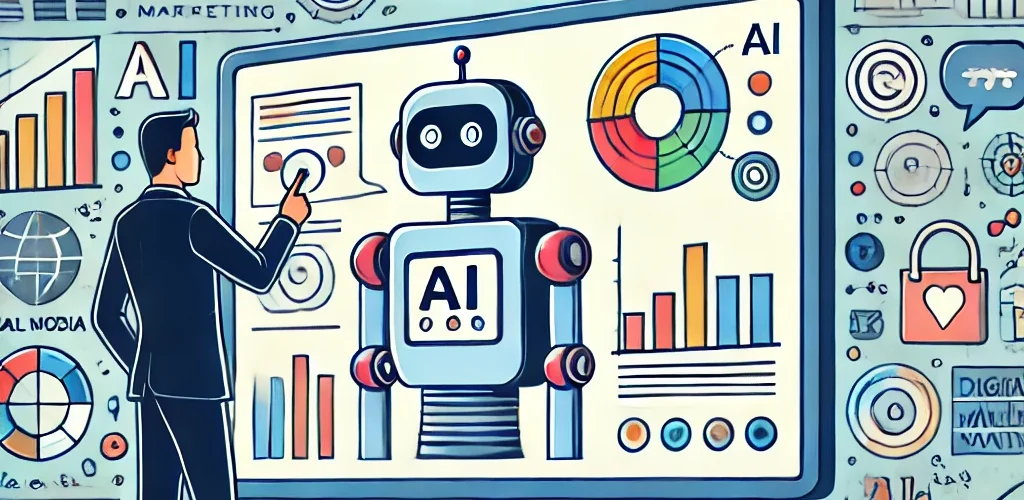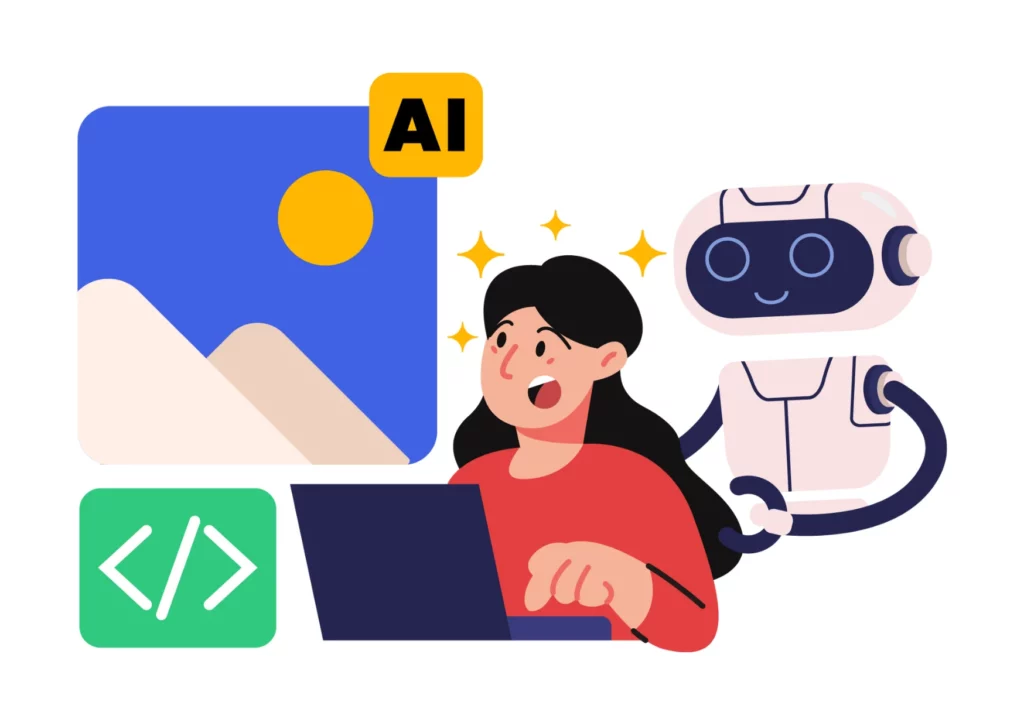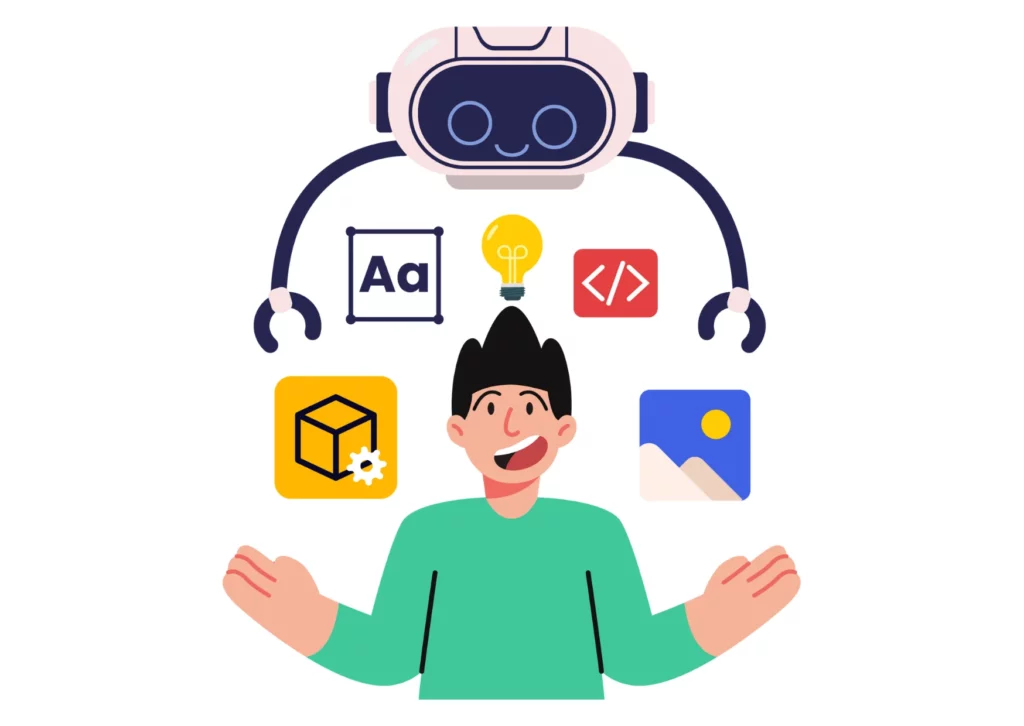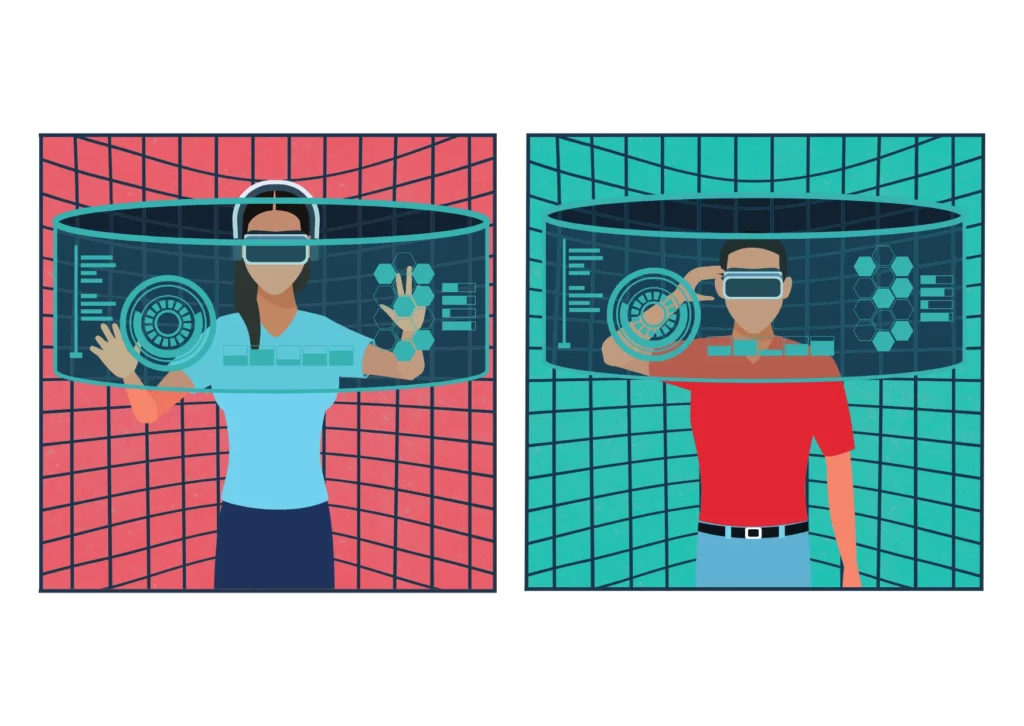
Today, digital marketing and artificial intelligence (AI) are transforming how businesses connect with people. As technology advances, marketers are increasingly adopting it. Professionals in content marketing, social media, and SEO are moving away from traditional methods and embracing new technologies and automation.
Digital marketing and AI are beginning to work closely together, and this collaboration will only intensify. If you thought AI in marketing would be a passing trend, you were mistaken! This powerful partnership is here to stay!
Table of contents
- The Evolution of Marketing: From Traditional to AI Marketing
- Integrating AI into Modern Marketing Strategies
- 1) Key AI Trends Transforming Digital Marketing
- 2) The Role of Machine Learning in AI Marketing
- 4) AI Features in Google Ads
- Future Predictions: What’s Next for AI in Digital Marketing?
- Conclusion: Embracing AI for a Smarter Marketing Future
The Evolution of Marketing: From Traditional to AI Marketing
Marketing has changed a lot over the past few decades, moving from traditional ways to digital strategies and now to using AI. These changes match how people behave, advances in technology, and what businesses need. Let’s look at this journey and how it affects marketers today.
- Traditional Marketing: Before the internet, marketing used things like print ads, TV commercials, radio ads, billboards, and direct mail. These methods tried to reach a lot of people broadly, not targeting specific groups. Traditional marketing is strong because it reaches many people and can make a strong impression.
- Digital Marketing: When the internet and mobile phones became big, digital marketing started. This uses online channels to advertise products and services. Digital marketing includes things like SEO (to show up in online searches), PPC ads (where you pay each time someone clicks on your ad), social media marketing, content marketing, and email campaigns. Digital marketing is popular because it’s cheaper, easier to measure, and lets businesses interact directly with their target audience.
- AI Marketing: AI marketing is the newest way to market products. It uses artificial intelligence to improve marketing efforts. AI can quickly look at lots of data, predict what consumers will do, and make ads better in real-time. Examples include personalized ads, chatbots for customer service, predicting trends, and automatic ad buying. AI marketing makes marketing more efficient and gives customers a better experience by making things more personal and automatic.
Integrating AI into Modern Marketing Strategies

Integrating AI into modern marketing strategies helps businesses use valuable insights and automate repetitive tasks. With AI, companies can better manage where they spend money on ads across different platforms, discover new types of customers by analyzing data more deeply, and deliver personalized content that matches what individuals like at the best times. This makes marketing more efficient and flexible, allowing businesses to quickly adjust to changes in what people want and how the market is doing. Overall, using AI in marketing helps companies connect more deeply with customers, improve how well their campaigns work, and stay competitive in today’s fast-changing digital world. Let’s take a look at these strategies.
1) Key AI Trends Transforming Digital Marketing
Keeping up with new trends is important. One of the biggest changes is the use of artificial intelligence (AI). AI is changing how businesses connect with their audience by predicting behavior, personalizing content, and improving customer service. We’ll look at the key AI trends that are transforming digital marketing and how they’re making strategies smarter and more efficient.
1. Predictive Analytics
Predictive analytics is a major AI innovation in marketing. AI can analyze huge amounts of data to predict future consumer behaviors and trends. This helps marketers create targeted campaigns, improving engagement and conversion rates.
For example, by understanding buying patterns, a business can tailor its ads to meet the specific needs of its audience, making marketing efforts more effective.
2. Personalized Marketing
AI allows brands to deliver personalized content and recommendations based on individual preferences and behaviors. This customization enhances the user experience, making consumers feel valued. Whether it’s through personalized emails, product recommendations on e-commerce sites, or tailored social media content, AI ensures each interaction is relevant and engaging.
3. Chatbots and Customer Service
AI-driven chatbots are revolutionizing customer service by providing instant, 24/7 support. These virtual assistants can handle a wide range of queries, from simple FAQs to complex issues, freeing up human agents to focus on higher-level tasks. With natural language processing, chatbots can understand and respond to customer inquiries in a conversational manner, enhancing the overall customer experience.
4. Voice Search Optimization
As voice search becomes more popular, optimizing content for voice queries is essential. AI plays a important role by understanding natural language patterns and user intent. Marketers need to adapt their SEO strategies to account for the conversational tone of voice searches. This involves using long-tail keywords, answering common questions, and ensuring content is easily accessible through voice-activated devices.
5. Programmatic Advertising
Programmatic advertising uses AI to automate the ad buying process in real time, allowing for more efficient ad placements. By analyzing user data and behavior, AI can determine the best times, platforms, and contexts for ad delivery. This not only maximizes ROI but also ensures that ads are seen by the right audience at the right time, enhancing the impact of marketing campaigns. By analyzing user data and behavior, AI, like that offered by Adsby enhances this process with advanced AI features, optimizing ROI by ensuring ads reach the right audience at the most opportune moments, thereby significantly boosting the impact of marketing campaigns.
2) The Role of Machine Learning in AI Marketing
Staying ahead of the competition requires more than just traditional marketing methods. Enter machine learning—a part of artificial intelligence (AI) that enables systems to learn and improve from experience without being programmed. But what exactly is machine learning, and how is it changing marketing automation?
Defining Machine Learning and Its Application in Marketing
Machine learning involves creating algorithms that can analyze large amounts of data, identify patterns, and make decisions based on the data with minimal human help. This technology is changing how businesses approach marketing by providing deeper insights, enhancing customer experiences, and optimizing marketing strategies.
In marketing, machine learning is applied in several key areas:
- Customer Segmentation: By analyzing customer data, machine learning algorithms can identify different groups within a target audience. This allows marketers to tailor campaigns more precisely and deliver personalized content that appeals to different customer groups.
- Predictive Analytics: Machine learning models can predict future trends based on past data. This is invaluable for forecasting customer behavior, such as the likelihood of making a purchase, stopping use, and long-term value, enabling marketers to make proactive decisions.
- Personalization: Personalized marketing is more effective, and machine learning makes it scalable. Algorithms analyze individual preferences and behaviors to deliver personalized recommendations, emails, and advertisements, enhancing the overall customer experience.
- Automation of Routine Tasks: Machine learning can automate repetitive marketing tasks such as email scheduling, social media posting, and even content creation. This not only saves time but also ensures consistency and accuracy in marketing efforts.
As we move further into the digital age, the integration of machine learning in marketing automation will undoubtedly continue to shape the future of smart digital marketing.
3) AI-Powered Content Creation

Content creation is a double-edged sword for many marketers. It lets us be creative, coming up with great blog topics and compelling eBooks or video scripts. But relying on intuition alone can make it time-consuming and complex. That’s where AI-powered content generators come in. They help streamline and expand content creation without compromising quality. AI can create various types of content—from blog posts and social media copy to eBooks, landing pages, emails, and even audio and video.
AI tools use natural language processing (NLP) and generation (NLG) to understand human language and create engaging content. Marketers input keywords and tones, guiding AI to produce tailored content fast and accurately.
While AI improves efficiency and content quality, it doesn’t replace human creativity. Human editing is still essential to refine content for brand consistency and platform requirements. AI shines in written content like blog posts, eBooks, emails, and headlines, even though visual content creation is advancing. After all, AI for content creation is incredibly beneficial for marketers and businesses. Here’s how they can help improve your content strategy.
The Benefits of AI Content Creation Tools
- Saving Time: Creating content takes a lot of time—thinking of ideas, writing, editing, and refining. AI tools automate many of these tasks, making it much quicker to create blog posts, social media updates, newsletters, and other content. This frees up time for marketers to focus on strategy and creativity.
- Improving Efficiency and Productivity: AI tools make things easier by handling tasks like coming up with content ideas, drafting initial copies, and even scheduling posts. This helps marketing teams work faster and more efficiently, ensuring content is produced and managed smoothly. It’s especially useful for keeping up with regular content updates without sacrificing quality.
- Saving Money: Hiring freelancers or agencies to create content can be expensive, especially for high-quality work. AI tools offer a more cost-effective solution by reducing the need for external help. They automate content creation and management, cutting down on costs associated with hiring and training content creators.
- Better SEO Results: AI-powered tools are great for improving your content’s visibility on search engines. They help identify popular keywords, suggest SEO-friendly content structures, and optimize your content for better search engine rankings. This means more people can find your content online.
- Higher Quality Content: While AI speeds up content creation, human oversight ensures the content meets your standards. Marketers can refine AI-generated content to match the brand’s voice, ensure accuracy, and engage the audience effectively. This combination of AI efficiency and human creativity results in compelling content that resonates with your audience.
4) AI Features in Google Ads
AI has been a part of digital marketing strategies through platforms like Google Ads long before it became widely known. Google has been a leader in using AI to transform advertising, using machine learning and automation to help businesses improve their online presence and advertising performance. Let’s dive into how these AI features in Google Ads are designed to boost your success.
1. AI-Driven Search Campaigns
AI-driven search campaigns leverage the power of machine learning to enhance bidding strategies, broaden match types, and improve ad relevance with great precision. This advancement means your targeting becomes more strategic, maximizing your investment returns. Over time, broad match capabilities have improved significantly, allowing you to fine-tune your search ad campaigns further. By combining broad match keywords with Smart Bidding and responsive search ads, you can capture numerous conversion opportunities that might have otherwise been missed, opening new paths for ROI.
2. Performance Max AI Features
Most digital marketers are familiar with Performance Max, a vital tool in Google’s advertising suite. However, many might not be fully aware of all its AI-driven features. Performance Max stands out by leveraging Google’s extensive range of advertising channels and resources, going beyond traditional search terms to find high ROI opportunities. It’s designed not only to expand reach but also to explore untapped audience segments and conversion opportunities. Performance Max uses Google’s vast data resources to identify potential customers who might otherwise go unnoticed, tapping into new market segments and user interests through sophisticated AI signals and machine learning that analyze user behavior, preferences, and trends.
3. Google Analytics 4 Measurement Enhancements
Google Analytics 4 (GA4) incorporates AI to automatically extract insights and predict future consumer trends, making it a powerful measurement tool. This predictive capability is particularly valuable for advertisers aiming to refine their campaigns for optimal performance and gain a deeper understanding of their consumer base. For instance, GA4 can integrate purchase data and revenue predictions into reports, empowering advertisers with data-driven strategies and a clear view of expected financial outcomes.
Future Predictions: What’s Next for AI in Digital Marketing?

The digital marketing world is changing quickly, and artificial intelligence (AI) is leading the way. But what can we expect in the future? Now, we’ll look at future predictions for AI in digital marketing, showing how these changes will shape the industry and change the way brands connect with their audiences.
1. Conversational Marketing
Conversational marketing uses tools like chatbots, voice assistants, and messaging apps to talk with customers in real-time, making the conversation feel more personal and human-like. This helps marketers provide faster and easier customer support and interaction. It also allows digital marketing agencies to gather valuable customer feedback and insights. As AI gets better at understanding natural language, context, intent, and emotion, we can expect more advanced marketing methods in the future.
2. Hyper-Personalization
AI in digital marketing will lead to hyper-personalization, going beyond basic customer segmentation. By using AI algorithms, businesses can study consumer behavior, preferences, and purchase history to deliver highly targeted and relevant marketing messages. Hyper-personalization will help brands create stronger connections with their audience, leading to increased customer loyalty and higher conversion rates.
3. Predictive Analytics: Data-Driven Decision Making
As AI continues to improve, its ability to analyze large amounts of data and extract meaningful insights will also advance. In the future, AI-powered predictive analytics will become a key tool for digital marketing agencies, enabling them to make decisions based on data and anticipate customer behavior. By using AI algorithms, businesses can identify trends, predict market demand, and optimize their marketing strategies for the best results.
4. Augmented Reality (AR) and Virtual Reality (VR)
AR and VR technologies have already made a big impact in gaming and entertainment, but their potential in digital marketing is huge. AI-powered AR and VR experiences will allow businesses to create immersive brand experiences for their customers. From virtual product try-ons to interactive brand stories, these technologies will change how consumers interact with brands, driving higher engagement and boosting sales.
The future of AI in digital marketing is promising and full of potential. As AI technology keeps advancing, marketers will have powerful tools to create more personalized, efficient, and effective campaigns. Staying ahead of these trends will be crucial for businesses looking to succeed in the ever-changing digital landscape.
Conclusion: Embracing AI for a Smarter Marketing Future
In this blog, we’ve discussed how AI is changing digital marketing in powerful ways. It’s not just a passing trend—it’s transforming how we do marketing. Marketers who embrace AI will have an edge in today’s competitive digital world. By using AI, you can create smarter marketing strategies that connect with your audience and deliver great results. Now’s the time to explore AI tools for your marketing. Start experimenting with AI today to find new opportunities and lead your business to future success.
Stay tuned for future blog posts that offer you practical insights to use AI in your digital marketing strategy.